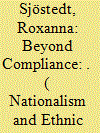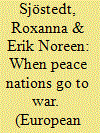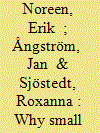| Srl | Item |
| 1 |
ID:
159906


|
|
|
|
|
| Summary/Abstract |
Implementation of minority rights norms is an important step for integration. The ultimate aim of norm diffusion is internalization, that is, when a norm is being taken for granted. This article seeks to develop an understanding of socialization beyond formal compliance and suggests that material and ideational structures at both the elite and societal levels mutually reinforce one another. The framework is applied to the case of the integration of the Russian minority in Estonia, 1991–2016. The concepts of recognition and solidarity help to theorize and explain this socialization process and the constraints of both materialist and identity dimensions.
|
|
|
|
|
|
|
|
|
|
|
|
|
|
|
|
| 2 |
ID:
179371


|
|
|
|
|
| Summary/Abstract |
What happens to dominant narratives and settled self-images of so-called peace nations when experiencing actual combat in out-of-area military missions? This question arises when studying the contemporary international engagement of small states that previously have mostly been engaged in peacekeeping with limited mandates and non-use of force restrictions. As today's international missions have altered radically, it is important to analyse narrative friction and transformation in small states with little prior experience of international war-fighting. This article addresses this lacuna by examining two small states and self-proclaimed peace nations – Sweden and Norway – in relation to their engagement in the International Security Assistance Force (ISAF), the NATO-led security mission to Afghanistan 2002–14. By examining the interplay and discursive struggle of two narratives — peace nation and military culture – this article finds that these narratives constantly constitute and reconstitute a small state's self-image and the boundaries for acceptable or even required behaviour. With altered principles regarding use of force there is an increased friction between the narratives. By addressing these frictions, the article contributes to the literature on small state international military engagement and develops and refines assumptions regarding the drivers and consequences of small state participation in out-of-area missions.
|
|
|
|
|
|
|
|
|
|
|
|
|
|
|
|
| 3 |
ID:
153643


|
|
|
|
|
| Summary/Abstract |
The security behavior of small states has traditionally been explained by different takes of realism, liberalism, or constructivism – focusing on the behavior that aims toward safeguarding sovereignty or engaging in peace policies. The issue of why states with limited military capacities and little or no military alignments or engagements decide to participate in an international mission has received limited attention by previous research. In contrast, this article argues that a three-layered discursive model can make the choices of small states more precisely explained and thereby contribute to an increased understanding of small states’ security behavior beyond threat balancing and interdependence. Analyzing a deviant case of a non-aligned small state, this article explains why Sweden became increasingly involved in the North Atlantic Treaty Organization (NATO)-led International Security Assistance Force (ISAF) mission in Afghanistan. By focusing on the domestic political discourses regarding the Swedish involvement in this mission, it is suggested that a narrative shapes public perception of a particular policy and establishes interpretative dominance of how a particular event should be understood. This dominant domestic discourse makes a certain international behavior possible and even impossible to alter once established. In the Swedish case, it is demonstrated that this discourse assumed a ‘catch-all’ ambition, satisfying both domestic and international demands. In general terms, it should thus be emphasized that certain discourses and narratives are required in order to make it possible for a country to participate in a mission such as ISAF and prolong the mission for several years.
|
|
|
|
|
|
|
|
|
|
|
|
|
|
|
|